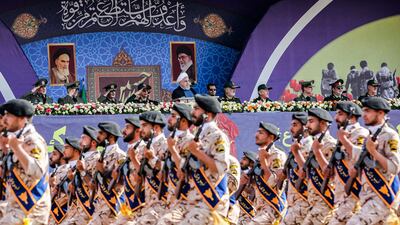Calling Iran a “regional menace” and pointing to prospects of increased violence between Israel and Tehran, the new US threat assessment report of 2021 released on Tuesday portrays a set of complex challenges for Washington in the Middle East and in countering Russia and China.
The report, released by Director of National Intelligence Avril Haines, presents the first assessment for the Joe Biden administration and its reading of global challenges.
Over 27 pages, the DNI lists great power competition, climate change, an increasing number of empowered non-state actors and rapidly evolving technology as the main threats for 2021. It names China, Russia, Iran and North Korea as the four states that “have demonstrated the capability and intent to advance their interests at the expense of the United States and its allies, despite the pandemic".
US intelligence frames Iran’s role as a “regional menace” because of its “broader malign influence activities".
Despite a worsening economy, the report says Iran will continue to use a range of tools, including expanding its nuclear programme and proxy and partner attacks, to advance its goals.
"We expect that Iran will take risks that could escalate tension and threaten US and allied interests in the coming year," the report says. "Iran sees itself as locked in a struggle with the United States and its regional allies, whom they perceive to be focused on curtailing Iran's geopolitical influence and pursuing regime change."
But it adds that “Iran’s willingness to conduct attacks probably will hinge on its perception of the United States’ willingness to respond, its ability to conduct attacks without triggering direct conflict and the prospect of jeopardising potential US sanctions relief.”

The report mentions Iraq as a main battleground for Iran’s influence “this year and during the next several years”, assessing that “Iranian-supported Iraqi Shia militias will continue to pose the primary threat to US personnel in Iraq".
In Syria, where the war is winding down, the report forecasts that Iran will pursue "a permanent military presence and economic deals".
The report also says Iran remains “a destabilising force in Yemen, as Tehran’s support to the Houthis – including supplying ballistic and cruise missiles as well as unmanned systems – poses a threat to US partners and interests, notably through strikes on Saudi Arabia".
The report makes mention of Iran's continued interest "in developing networks inside the US – an objective it has pursued for more than a decade".
It says: “During the past several years, US law enforcement has arrested numerous individuals with connections to Iran as agents of influence or for collecting information on Iranian dissidents in the United States, and Iran’s security forces have been linked to attempted assassination and kidnapping plots in Europe, the Middle East and South Asia.”
On the nuclear front, the report says that if Tehran does not receive sanctions relief, "Iranian officials probably will consider options ranging from further enriching uranium up to 60 per cent to designing and building a new 40-megawatt heavy water reactor."
On Tuesday, Iran announced upping its enrichment to 60 per cent in breach of the nuclear deal. The report also states that the "iterative violence between Israel and Iran" has "the potential to escalate or spread".
Addressing other threats, the report calls China “a near-peer competitor, challenging the United States in multiple arenas – especially economically, militarily and technologically – and is pushing to change global norms".
The report expects Taiwan to be a major area of concern, where China will press “authorities to move towards unification and will condemn what it views as increased US-Taiwan engagement".
It says: “We expect that friction will grow as Beijing steps up attempts to portray Taipei as internationally isolated and dependent on the mainland for economic prosperity, and as China continues to increase military activity around the island.”
It also views Russia as “pushing back against Washington where it can globally, employing techniques up to and including the use of force".

It reiterates its assessment that Moscow "tried to kill opposition activist Alexei Navalny inside Russia in 2020 with a fourth-generation chemical agent".
Due to the geographical reach of the former Soviet Union, the report says Russia is "well positioned to increase its role in the Caucasus, intervene in Belarus if it deems necessary and continue destabilisation efforts against Ukraine while settlement talks remain stalled and low-level fighting continues".
In Afghanistan and even as US President Joe Biden prepares to announce the withdrawal of troops by September 11, 2021, the report forecasts that the Taliban will strengthen its position.
“The Taliban is likely to make gains on the battlefield, and the Afghan government will struggle to hold the Taliban at bay if the coalition withdraws support,” it says.
In the broader Middle East, the report forecasts that it will remain a "region characterised by pervasive conflicts, with active insurgencies in several countries, sparring between Iran and other countries, and persistent terrorism and protest movements sparking occasional violence".
It says the fallout from Covid-19 pandemic will create more volatility and socioeconomic grievances in the region.
Intelligence officials will present their report and findings to Congress on Wednesday.


